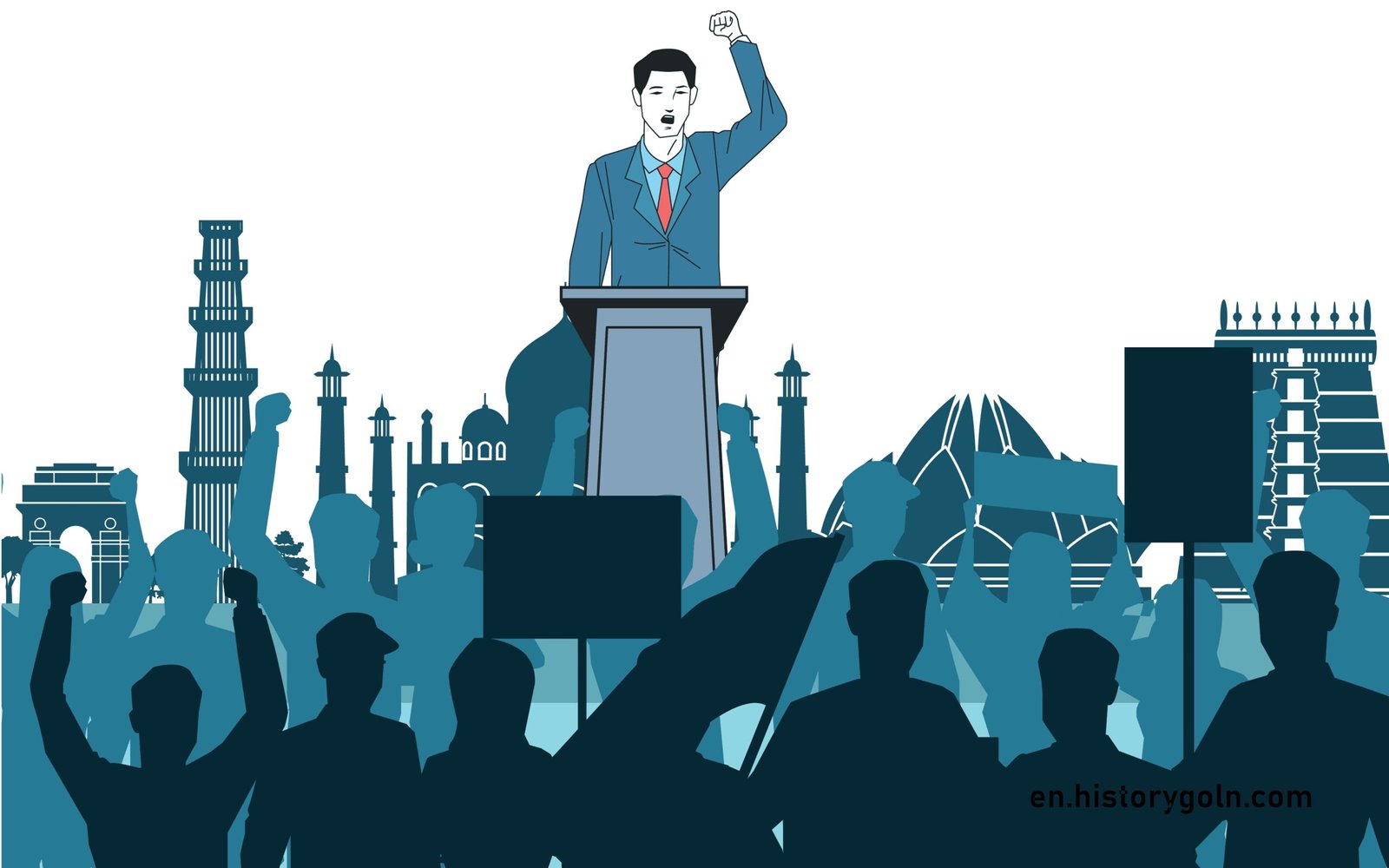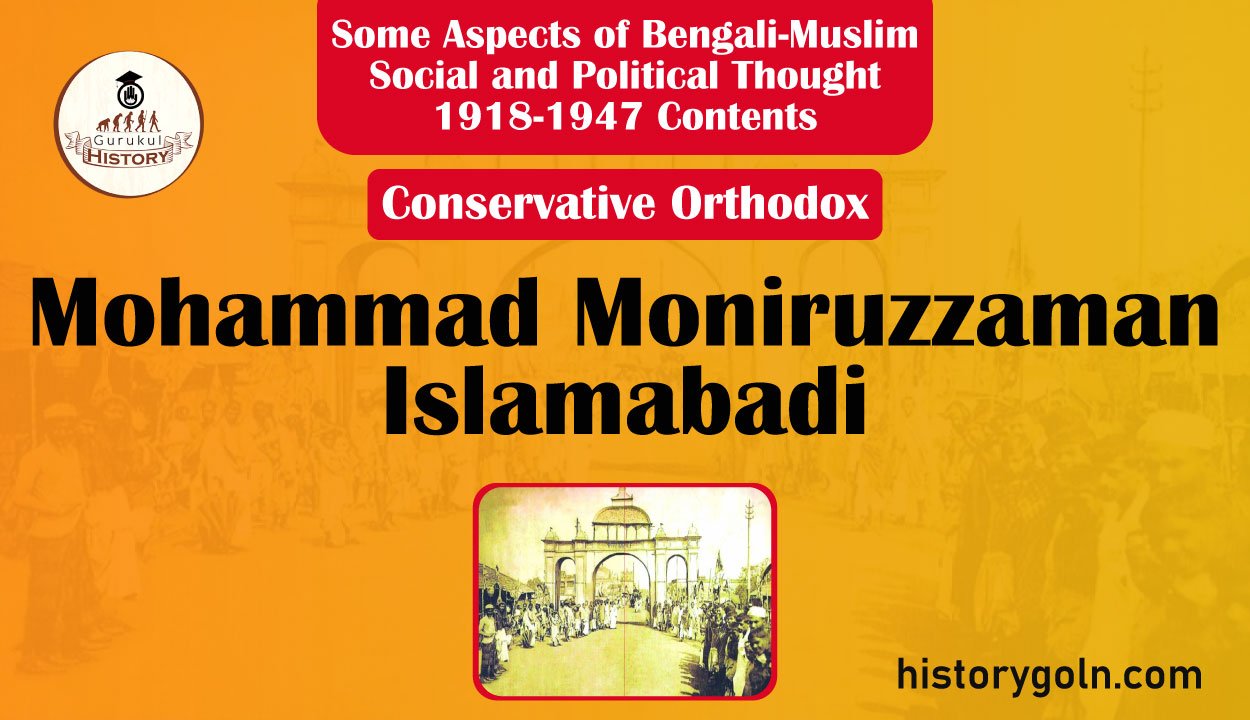Today is our topic of discussion Mohammad Moniruzzaman Islamabadi .
Mohammad Moniruzzaman Islamabadi

Mohammad Moniruzzaman Islamabadi was one of the earliest Bengali Muslim nationalist leaders. He was contemporary of Moulana Mohammad Akram Khan (1868-1968), Maulana Abdullah-el Baqi (1886- 1952) and his brother, Maulana Abdullah-el Kafi (1900-1960) who had made great impact on the social, political and religious thought of the Muslim community in Bengal in the early decades of the present century.
But Islamabadi followed a different trend from the rest of them. Although educated at madrassah (religious schools) he did not come out as an orthodox or a dogmatic person.
Moniruzzaman Islamabadi was born in 1875 at Potia, a police station of the village of Aralia in Chittagong district.2 Islamabadi was not his surname. He was called so because of his birth in the district of Chittagong which was previously known Islamabad.3 Islamabadi learnt Arabic and Persian and for a brief period learnt Bengali in his childhood. In 1889 he was admitted to Hooghly madrassah where he learnt Arabic and Persian.
He passed the “title” examination, i.c. madrassah school final in 1895 with distinction. He was placed first in the first division. Islamabadi had to choose a profession but he detested the job and life style of the mullahs and maulvis (religious preachers). He believed that they lived on the charity from others and were involved in useless religious debates depending on exaggerated and inaccurate views of religion.
From an early age he believed that the mullahs and maulvis created confusion among the rural people by their limited knowledge of both religion and practical life. He was determined to depart from the traditional profession of the mullahs. As a child he probably had come across bahas meetings which involved acrimonious debates relating to religion and had developed a dislike for the mullahs.
Bahas or religious debates were very common in the late nineteenth and in the early twentieth centuries in Bengal 6 The debates took place between the Hanafi 7 and the reformist Muslims, particularly the Ahl-i-Hadith 8 and the Mohammadi 9 sects of Islam. After much hesitation he took up teaching at madrassahs, 10 Islamabadi could not get better job other than teaching at madrassahs because his own education at madrassah was incomplete and impractical.
Islamabadi himself realized this fact as he wrote in his autobiography that during his education at the madrassah no knowledge was given on the political and social conditions he lived in. The madrassah students did not know anything about whether Geopgraphy or History.
Islamabadi doubted the teachers knew anything about the above subjects.11 The madrassahs did not have any arrangement for physical education. Islamabadi pointed out the limitation of madrassah education which did not match with the needs of the time. 12 In practical life Islamabadi felt the need to know Bengali. He knew the colloquial Bengali of Chittagong region.
Later he learnt the language so that he could write in that medium. He had also learnt Urdu. Islamabadi was largely self-taught. From 1896 onwards he started teaching at madrassahs in Rangpur and Chittagong 14 He introduced the teaching of Geography, History, Politics, Sociology, Theology and Bengali.
He also stressed the need to learn Urdu. 15 At the same time he continued to expand his knowledge on various subjects, particularly politics, Sociology and Theology. The years from 1901 to 1903 acted as the formative period for the development of his later political and social ideas. He read works of various scholars and thinkers like Socrates (470 B.C.- 399 B.C.),
Omar Khayyam (1050-1123 A.D.), Abu Hamid Ghazali (1058-1111 A.D.), Ibn-Arabi (1165-1240) and also the lives of Luther (1483-1546), George Washington (1732-1799), Syed Ahmed Barelvi (1786-1831), Mazzini (1805-1872) Garibaldi (1807- 1882), Sir Syed Ahmad Khan (1817-1898), Jamaluddin Afgani (1838-1897) and other political and social reformers of both the East and the West.
He formed a liberal and progressive view about society and religion. He believed in secularism and in nationalist politics. He was orthodox in religious matters but that did not prevent him from having a rationalistic approach to the social and political issues of his time.
Moniruzzaman Islamabadi started his political career in 1914 by attending the All Bengal Proja Conference in Mymensingh. The conference was one of the earliest attempts to start a secular movement with the peasants, based on economic programme and directed mainly against the zamindars. 17 Most of its leaders were landlords and talukdars (lesser landlords) and, therefore, it could not become too radical in its programme.
It limited its attempts to achieve the peasants’ demand for the abolition of abwabs (illegal exactions), the transfer fee (payable to Ithe landlord during cach sale or transfer of the ralyati holding), zamindar’s right to eviction and enhancement of rent, etc. 18 The programme of the All Bengal Proja Conference could not be followed up because of the First World War.
Islamabadi then joined the khilafat and non-co-operation movement in 1920 and had attended the Khilafat Conference earlier in 1914 at Lucknow. In that conference Islamabadi spoke in Bengali 20 He had learnt Bengali realizing that this was the most popular medium if he had to make an impact on the masses. Most Muslim leaders in Bengal preferred to speak at gatherings in Urdu. This had so long acted as a barrier in communicating with the masses. Islamabadi was in the Khilafat Committee.
He started working in the Soltan 21 as an editor from 1923 onwards and campaigned for support for the Khilafat and Non-co-operation movement. Islamabadi attended the special conference of the Jamiat-ul-ulama-i-Hind (Association of the ulama of India) in Delhi in September, 1923. At this conference, the ulama who were in a disorganized state, were urged to unite and deal with the various political and social problems of India.

According to the decision of the ulama in Delhi, the Jamiat-ulama-i-Bangla (Association of the ulama of Bengal) took up programmes to boycott the peace celebration (after the 1914-1919 war) Moniruzzaman Islamabadi was the Assistant Secretary of the Jamiat-ulama-i-Bangla around this time 22 He was a pan-Islamist and a follower of the Deoband school.23 Islamabadi had a combination of both fundamentalist belief in religious matters and a very practical approach to political affairs.
All through his life he believed in accomodating with the Hindu community of India. Like the Deobandis he was strongly anti-British and had showed sympathy with the Caliphate of Turkey. He supported the struggle for national independence and at the same time campaigned for the preservation of the Caliphate.
Pan-Islamism was an extra-territorial movement which went paradoxical with the demand for national independence. From the years 1919 to 1924 the Khilafat Movement in India represented such a struggle. It failed to achieve its demand but contributed greatly to the mobilization of masses by introducing mass participation in politics.
Islamabadi preached that the Caliphate must be protected from dishonour. He wrote that the Caliphate was the backbone of the Muslim world. The British had fought against Turkey, had occupied most of its territory and had tarnished the prestige of the Caliph. Seventy million Muslims of India had for the past few years urged the British government to protect the Caliphate.
Two Hundred and thirty million Hindus had also joined the Muslims supporting their demand but to no avail. The Muslims had no other alternative than to adopt non-co-operation with the Government 24 The Soltan, of which Islamabadi was the editor from 1923 onwards, was an independent weekly and expressed Muslim public opinion.
It acted as a mouthpiece for the Khilafat movement. Islamabadi wrote articles in the Soltan and the Al-Eslam in favour of the non-co-operation and the Khilafat movement 25 In 1924 when the Caliphate in Turkey was abolished the movement died out.
Moniruzzaman Islamabadi then got involved in nationalist politics. He believed in secularism and supported C.R. Das (1870-1925) in forming the Bengal Pact in April, 1923. He had also joined the Swaraj Party in January, 1923.26 He did not believe in separatist politics of the Muslim League.
To Islamabadi the demand for Pakistan was self-destructive for the Muslims in India. Once partition place, he told, the Muslim community would be divided into three groups, one in India, one in the North-West and the other in the North-East.
Partition would disintegrate the Muslim community in India 27 Moniruzzaman Islamabadi never believed in parliamentary politics but quite surprisingly, he contested election in 1937 as Krishak Proja Party candidate from Southern Chittagong constituency and was elected a member of the Bengal Legislative Assembly 28 Later, he again contested from Chittagong in 1946 to enter the Bengal Legislative Assembly.
He was defeated.29 There was doubt about his connection with the terrorists in Bengal. He had read Mazzini and Garibaldi in his formative years and had joined Subhas Chandra Bose’s Azad Hind Fauz formed in 1943.30 He supported Bose’s idea of taking up arms against the British and even talked of supplying arms for that purpose. The British government had suspected him of having connections with the Japanese in order to procure arms and had arrested him for a brief period in 1944,31
One can see a strange mixture of beliefs in Moniruzzaman Islamabadi. On the one hand he believed in extra-parliamentary politics, on the other, he participated in parliamentary politics. He was a Deobandi and a secular nationalist and at the same time, had leanings towards extremist politics.
Moniruzzaman Islamabadi’s view on improving the Muslim society in Bengal was progressive in his time. He stressed the need for Muslims to learn English and Bengali. He wrote that education at madrassah was incomplete and its curriculum must include English, Bengali, History, Philosophy, Chemistry, Geography, Sociology and Anthropology. 32. Even in 1926, Bengali had not been introduced in the Calcutta Madrassah.33
Ever since Islamabadi had been pressing for the introduction of these subjects he was criticized by the orthodox Muslims who said that Islamabadi was introducing an irreligious education. They objected to his suggestions as “un-Islamic” and condemned him. They called him “an atheist, very much similar to the Europeans whose aim is to achieve worldly gains. It is doubtful whether he believes in the life hereafter. ”
Islamabadi was very much against the extremities in the preachings of the reformist Muslims and the fundamentalists. He wrote in the Soltan in 1923 that the conflict between the Hanafi and the Mohammadi sects had reached to the point of fanaticism.
He strongly opposed the religious debates between the Ahl-i-Hadith and the Mohammadi sects on one side and the Hanafis on the other. He wrote that the leaders of the Anjuman-i-ulama had attempted to establish communal harmony in Bengal but the petty quarrels on religious practices and rites had created confusion among the illiterate masses. It also contributed to communal discord .
Islamabadi was also against pirs (saints) and mullahs (priests). As carly as 1903 he wrote that the Muslim society in Bengal was full of half- educated and illiterate mullahs and maulvis (priests), about forty to fifty thousands of them, engaged in preaching conservativeness rather than giving proper religious education.
He wrote, “if the present society could be made free from the grips of the maulvis, mullahs and pirs it would have developed long ago. The maulvis and mullahs have pushed the development of the society a century backwards. ”
Islamabadi was against pirs and pirism. He strongly objected to the practice of visiting dargahs and mazars (tombs of saints), manats (promising sacrifice of animals or wealth in return for good luck) and other practices considered shirk (un- Islamic),38 He preached that the Muslims must be brought out of their ignorance and conservativeness. This he believed, was the pre-requisite for the community’s development.
He hated social divisions amongst the Muslims particularly the ashraf-atrap distinction, which he believed, had been taken to the extreme point where the atraps (Muslims of lower strata) were not even allowed to pray in the same mosque,39 Islamabadi advised the Muslims to give up extravagancy in their spending. He noted that the Muslims foolishly got involved in litigations for petty reasons thus spending hard-earned money which otherwise could have been saved.
He pointed out that the practice among Muslims to spend too much at weddings and circumcision, food, music, dance and fireworks contributed to their economic distress. What had worsened their condition further was that they spend the money they often borrow with interest 40 He suggested that Muslims should try to accumulate capital and get involved in trades.
A supporting income from trade would save them from distress during famine and bad harvest. He wrote that there were few blacksmiths, goldsmiths, milkmen or fish merchants among Muslims. They had considered these jobs degrading. A false pride/worked in them because of their past glory which had even after decades had remained in them in a form of complexity.
In short, Moniruzzaman Islamabadi can be considered one of the leading Muslims in Bengal who upheld the cause of the Muslims and at the same time pointed out to the Muslim community the necessity to improve and develop both in economy and in education. He was tolerant of the Hindu community and at the same time was conscious of the reasons behind communalism.
He understood that competition for jobs and services between the Hindu and the rising Muslim middle class had intensified communal ill-feeling in Bengal. Islamabadi believed that economic development, literacy and enlightenment would gradually remove such complexities. He was a secularist in politics and had to face severe criticism from the orthodox Muslims.

They even called him un-patriotic and an enemy of the Muslim community 42 Islamabadi was a nationalist Muslim who believed in maintaining a united India where religion could not act as an obstruction to communal harmony. He never believed in two-nation theory of the Muslim League and was opposed to Pakistan because he felt that would fail to solve the minority problem.
